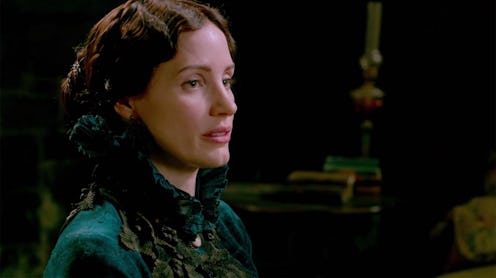Entertainment
Jessica Chastain Is The Most Generous Actor Today

You couldn’t really call being Jessica Chastain a thankless job. The public stands in practical unanimity about her onscreen talent and off-screen charm. In the four years since her 2011 breakout, the actress has accrued two Academy Award nominations and a Golden Globe victory. And with two movies both hitting theaters this month, it’s clear that Hollywood has no intention of dropping Crimson Peak star Chastain from its A-list roster. Nevertheless, one source has been particularly withholding of due recognition for Chastain’s contributions to every movie she appears in: the movies themselves.
Often overshadowed by spotlighted co-stars or domineering subject matter, Chastain is rarely the focus of her own movies. Since playing the titular character in her feature debut Jolene, Chastain has kept fairly consistently to the supporting player pool. Such a habit has yielded its own rewards; the industry has celebrated Chastain’s efforts in The Help, Interstellar, and A Most Violent Year with Oscar, Golden Globe, and Saturn Award nominations. But, months or years after said releases, what — or better yet, who — do we best remember from these pictures?
We cite The Help only to laud the still grossly underused Viola Davis and Octavia. We recall Interstellar as a uniquely emotional ambition for Christopher Nolan, a bullet point in the ever-escalating career of Matthew McConaughey, or a landmark of the modern generation’s exploits in science fiction cinema. But what about Chastain?
This isn’t because Chastain doesn’t supply The Help and Interstellar with strong performances; she works wonders in both. It’s because each movie demands you turn your attention elsewhere. In each of these films, the central character is the topic at hand: The Help’s is racism — in a roundabout way, the formidably pleasant film fulfills its chosen destiny via our lasting discussion about the unjust absence of women of color, like its talented stars, on the big and small screens — and Interstellar’s is science — a likewise successful effort, even if a prevalent part of the resultant conversation was to tear apart the logical holes therein. (At least we’re talking about space, right?)
On the other hand, A Most Violent Year is a bona fide character piece, and, as such, the most conducive of the lot to the formation of a “Chastain picture” legacy. When the film came out, in fact, the conversation leant toward the combat between Chastain’s internal brawn and screen husband Oscar Isaac’s demure vulnerability. But, while Chastain’s involvement in this harmony was a favored takeaway from the small but revered drama, the passage of time allowed for fewer and fewer memories of her work independent of its chemistry with Isaac.
A Most Violent Year uses the Chastain character to better color its hero, cementing ultimately as an “Isaac picture” alone. Even those of us who championed Chastain’s performance cannot say that it has had quite the same sway on our view of her work ever since. We’ve compared and contrasted Isaac’s turns in Ex Machina and Show Me a Hero with his A Most Violent Year role; have we done the same for Chastain in regard to The Martian and Crimson Peak?
We might, however, lay the bulk of the blame for such inopportunity at the feet of the latter films. The Martian, though priding itself on the whimsy of an all-cylinders-firing ensemble, is without a doubt Matt Damon’s movie. Chastain exists as the space captain who left a presumed-dead Matt Damon on Mars, and then as the space captain charged with the question of retrieving a not-so-dead-after-all Matt Damon from Mars. For her part, Chastain is funny, empathetic, charismatic, admirable, strong, and relatable. But, in light of not being Matt Damon, there’s only so much of our attention she can hold during and after The Martian.
She gets a bit more room to shine in Crimson Peak , upping the ante on a creep factor we first saw hints of in Mama. But, in both efforts, the style and temper reign supreme. Even headliners Mia Wasikowska and Tom Hiddleston are outdone by Guillermo del Toro’s grand aesthetic and rhythm in Crimson Peak. Their jobs, ditto Chastain’s, are to bring this wild, often wacky world to life — and they thoroughly succeed in making sure it is the world that sticks out the most in our memories.
Even when playing starring roles does she cater to dominant surrounding forces. As the Oscar-nominated star of Zero Dark Thirty, Chastain — absolutely magnificent in the film, I might add — is playing second fiddle to the incredible premise of a movie about the seizure of Osama bin Laden. As half of the romantic pairing in the double feature The Disappearance of Eleanor Rigby, Chastain not only splits attention with co-star James McAvoy, but likewise with the very notion of dual perspectives that the experiment rode on.
Nevertheless, Chastain seems undaunted, supplying reliably magnetic work to movies that prioritize genre, subject matter, or top billers over her performances. Perhaps it's appreciation from fans that fuels this energy, or simply a love for the craft. Whatever the motivation, you could call her one of the most generous actors in cinema today.
Images: Universal Pictures (2); Disney; A24